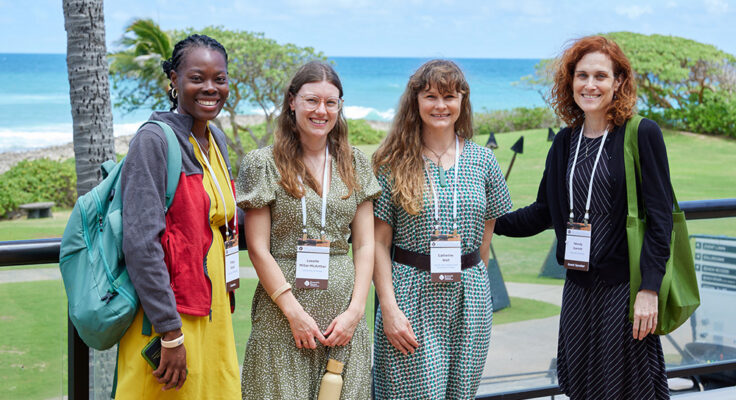The Kenneth Rainin Foundation’s 2025 Innovations Symposium returned to Hawai`i in July to encourage new ideas and collaborations in Inflammatory Bowel Disease (IBD) research. The annual event drew 133 researchers, clinicians and industry professionals from around the world for two and a half days of presentations and poster sessions. This year’s gathering was enriched by a sense of community and shared purpose.
By all accounts, this year’s gathering offered researchers refuge and renewal. The experience of being in community in the face of adversity against science restored their passion for their chosen field.”
Laura Wilson, PhD, Director, Health Strategy & Ventures
Creating Space For Respite And Rejuvenation
Foundation CEO, Jen Rainin, PhD, welcomed participants and invited everyone to take the time to breathe, learn and connect. The natural beauty of this year’s location on O`ahu at Turtle Bay offered researchers respite and rejuvenation at a time when science and research funding are under attack. Bringing our scientific community together created a much needed space to rekindle passion and seed collaborations.
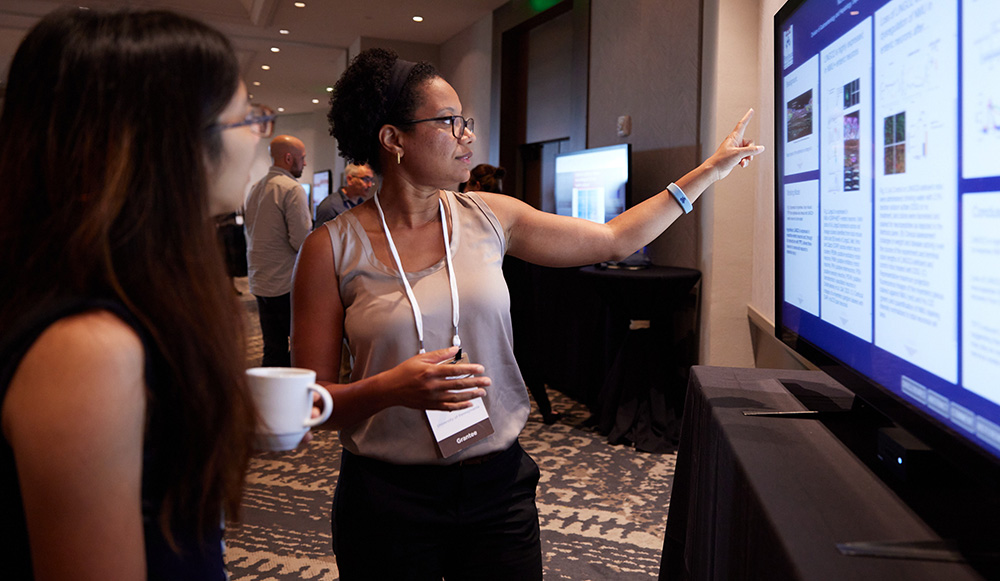
We keep this event small and build in ample time for networking, which benefits everyone from established investigators to trainees. This annual gathering is a key strategy in our work to advance the field by supporting a diverse pipeline of scientists. Early career researchers are essential to finding a cure for IBD, helping to introduce technologies and directions that invigorate the science. More than one-third of this year’s attendees were graduate students and postdocs and 18% of attendees identified as early-career scientists. The Foundation offers Travel Awards to students and postdocs who share their research during poster sessions. Of the 53 posters featured, 16 attendees received Travel Awards to support their participation.
This was my first time sharing my research as a postdoc, and I couldn’t have imagined a more inspiring environment to do that in. You’ve truly created a space where creativity and collaboration thrive.”
Alexx Shumway, PhD, Cornell University

To further reduce barriers to attendance and support greater equity, the Rainin Foundation encouraged bringing family members and loved ones, which drew another 113 guests, including 36 children. The event featured a family friendly reception and grantees and their trainees and speakers were reimbursed for childcare expenses incurred during event sessions.
Sharing Compelling Insights To Advance IBD Research
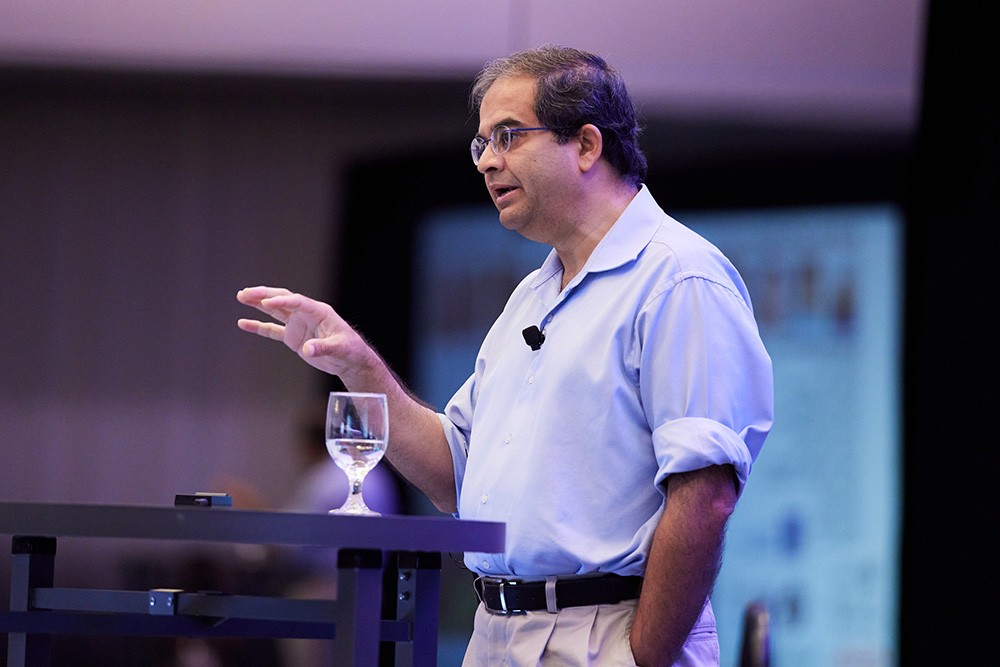
Sixteen experts shared a range of insights and recent advancements in understanding and treating IBD. Leading off the first day of presentations was Saurabh Mehandru, MD, Director of the Helmsley Inflammatory Bowel Disease Research Center at the Icahn School of Medicine at Mount Sinai. With early funding from the Rainin Foundation, he had revealed the underappreciated role of B cell dysfunction in IBD pathology and treatment. His translational research across a range of autoimmune diseases now boasts a global reach, with collaborations in 19 countries over five years. Fellow gastroenterologist James Lee, MD, PhD, is Clinician Scientist Group Leader at the Francis Crick Institute. Dr. Lee discussed how tiny differences in our DNA predispose us to autoimmune diseases. His lab hopes to uncover new disease pathways and determine whether these could be targeted to provide better treatments.
Two other physician scientists center their translational research on the earliest manifestations of IBD. Aleixo Muise, MD, PhD, is Professor at the University of Toronto and Staff Gastroenterologist at its affiliate hospital, SickKids. Dr. Muise focuses on understanding the genetic cause and function of identified genes in pathogenesis of Very Early Onset Inflammatory Bowel Disease. He presented findings about what monogenic IBD (mIBD) teaches us about precision IBD treatment. Liza Konnikova, MD, PhD, Associate Professor at Yale University, shared her research into early-life mucosal immune development and implications for inflammation.
Our scientific community is working on new therapies, new diagnostic tools and increasing our understanding of IBD. All of that work gives me hope for improved outcomes for IBD patients like me.”
Jen Rainin, PhD, CEO
Deciphering The Complexity Of IBD
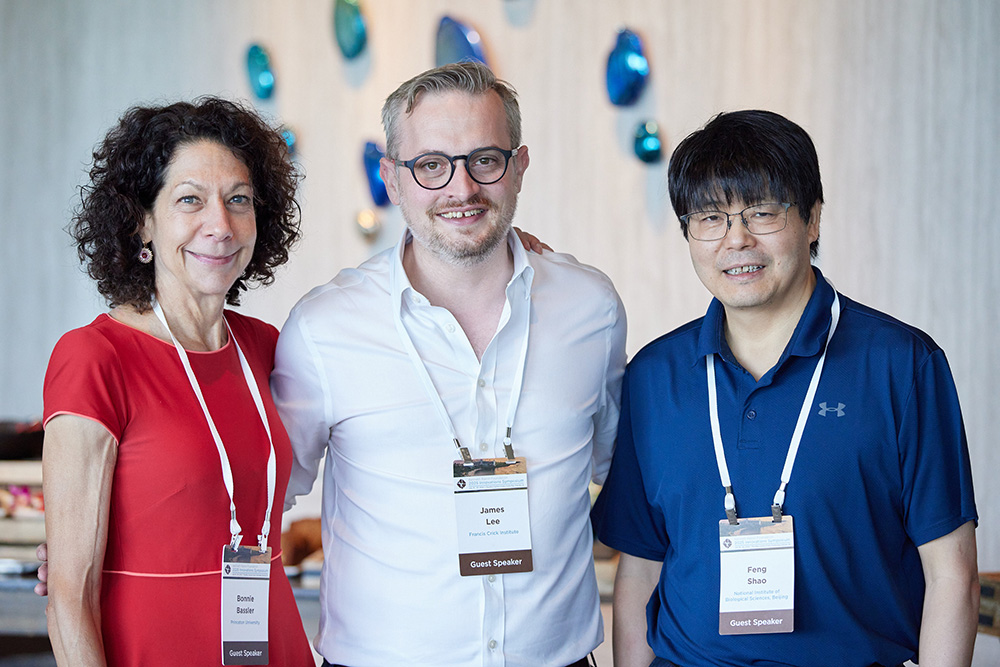
Symposium presentations also highlighted the importance of basic research to deciphering the complexity of IBD. A prime example is the work of Bonnie Bassler, PhD, a Professor at Princeton University; Howard Hughes Medical Institute Investigator. She discussed quorum sensing, the fundamental process of cell-to-cell communication that enables bacteria to regulate gene expression on a community-wide scale. Her research is paving the way to developing novel therapies for combating bacteria by disrupting quorum-sensing-mediated communication.
At Harvard University, Wendy Garrett, MD, PhD, focuses on mucosal immunology and the gut microbiota. She discussed her lab’s broadly applicable research interrogating the role of microbes and their metabolites in shaping susceptibility and resistance to diseases, including IBD. Dan Littman, MD, PhD, a Professor of Molecular Immunology at New York University, specializes in T-cell response. He updated attendees on microbiota-directed adaptive immune system dysfunction in IBD. The role of novel technologies fuels the work of Rustem Ismagilov, PhD, Professor of Chemistry and Chemical Engineering at California Institute of Technology. He showcased new tools for more accurate and reproducible analysis of bacteria, fungi and viruses in human tissues.
Illuminating Progress In IBD Research
A varied slate of presenters shared invigorating perspectives on recent advances in IBD research:
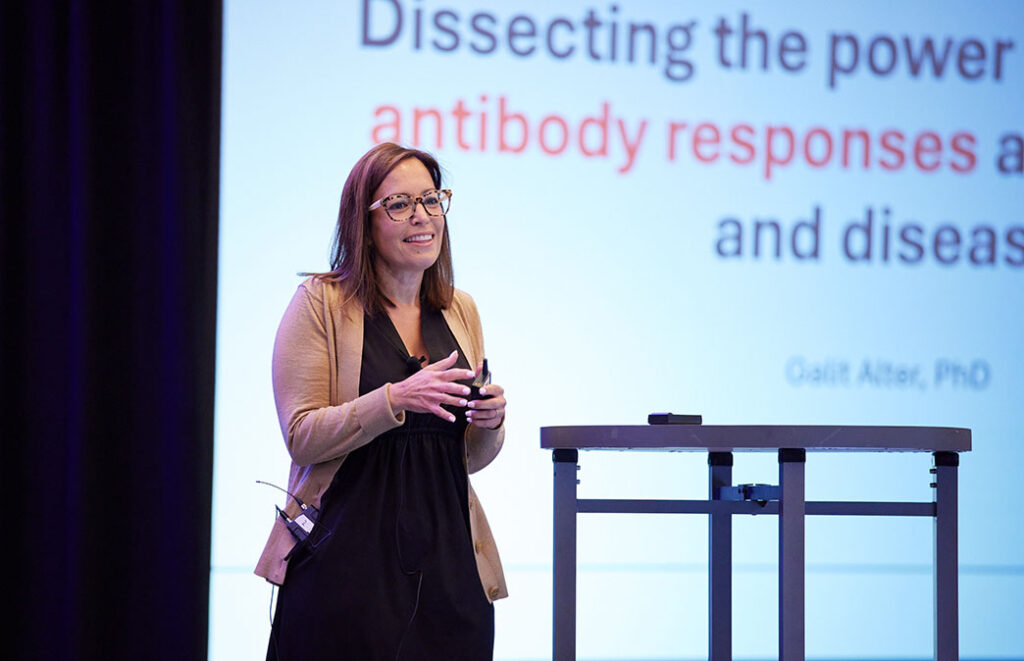
- Galit Alter, PhD, Professor of Medicine, Ragon Institute of Massachusetts General Hospital, Massachusetts Institute of Technology and Harvard University, Dissecting the Power of Polyclonal Antibody Responses Across Health and Disease
- Janelle Ayres, PhD, Professor, Howard Hughes Medical Institute Investigator, Salk Institute for Biological Studies, Nutrient Control of Infection Defense
- Bonnie Bassler, PhD, Professor, Princeton University; Howard Hughes Medical Institute Investigator, Quorum Sensing Across Domains: from Viruses to Bacteria to Eukaryotes
- Isaac Chiu, PhD, Professor, Harvard Medical School, Nociceptor Neuron Regulation of Intestinal Barrier Function and Tregs
- Wendy Garrett, MD, PhD, Professor, Harvard University, Microbial Bioactive Discovery for Inflammatory Bowel Diseases
- Elaine Hsiao, PhD, Associate Professor, University of California, Los Angeles (UCLA); Director, UCLA Goodman Luskin Microbiome Center, Gut Microbial Signals for Regulating Neural Circuits Underlying Behavior
- Rustem Ismagilov, PhD, Professor, California Institute of Technology, Technologies for Accurate and Reproducible Analysis of Bacteria, Fungi and Viruses in Human Tissues
- Liza Konnikova, MD, PhD, Associate Professor, Yale University, Early-life Mucosal Immune Development and Implications for Inflammation
- James Lee, MD, PhD, Clinician Scientist Group Leader, The Francis Crick Institute, From Single Nucleotide Polymorphisms to Biology in IBD
- Dan Littman, MD, PhD, Professor, New York University, Microbiota-Directed Adaptive Immune System Dysfunction in IBD
- Saurabh Mehandru, MD, Professor, Icahn School of Medicine at Mount Sinai; Director, Helmsley Inflammatory Bowel Disease Research Center, B cell Dysfunction in Inflammatory Bowel Diseases
- Aleixo Muise, MD, PhD, Professor, University of Toronto; Staff Gastroenterologist, SickKids, What Monogenic IBD (mIBD) Teaches Us About Precision IBD Treatment
- Bali Pulendran, PhD, Professor, Stanford University, Decoding the Human Immune System Through Systems Vaccinology
- Carla Rothlin, PhD, Professor, Yale University, Decoding the Response to Cell Death in the Gut
- Feng Shao, PhD, Investigator and Deputy Director for Academic Affairs, National Institute of Biological Sciences, Beijing, The ADP-heptose/ALPK1 Innate Immune Pathway in Cancer Immunity and IBD
- Ivan Zanoni, PhD, Associate Professor, Harvard Medical School, Molecular and Cellular Regulation of Intestinal Inflammation
Save The Date For The 2026 Innovations Symposium
Join us on July 19-21, 2026, at The Palace Hotel in San Francisco, California, to hear the latest in Inflammatory Bowel Disease research and connect with scientists from around the world. Stay tuned via our newsletter and follow us on X (formerly Twitter) or Bluesky for the latest information.
